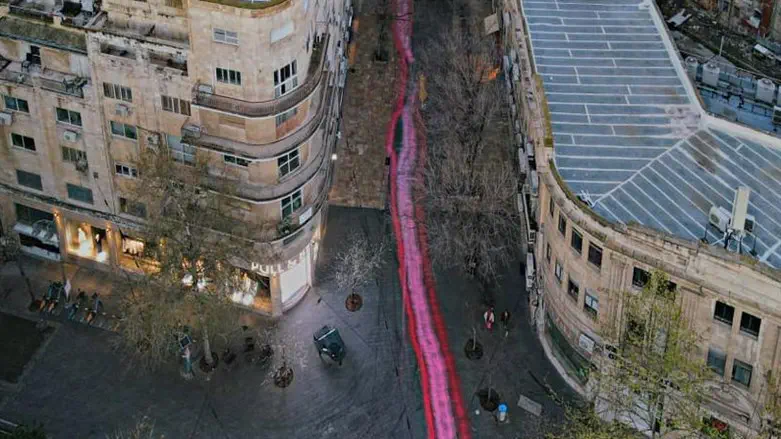
Thursday morning saw the opening of yet another day of planned national disruption, with the organizers of the ongoing anti-government protests operating across the country in what they are calling a "Day of Shame in Opposition to Dictatorship."
Already early in the morning at half-past-seven members of the "Brothers in Arms" group made up of reservists arrived in the haredi city of Bnei Brak in order to establish a mock army recruiting office outside the municipality building.
At the same time, a number of navy veterans sailed small boats into Haifa port and blocked the entrance to merchant ships, proclaiming, "Sailors refusing to sail toward dictatorship."
Overnight, police arrested five activists who are suspected of having painted main roads in Jerusalem while disguised as municipal workers and with masked faces. The road leading up to the Supreme Court building has been spray-painted in red and pink.
450 Army officers and soldiers from the special operations and cyber branches hung a huge billboard at the Elyakim junction upon which was written, "Dictatorship is splitting the nation."
Starting at eight o'clock this morning, parents and children from across the country will be participating in road-blocking events. A protest outside various embassy buildings in Tel Aviv is planned for ten o'clock, and at seven o'clock this evening, a large protest is planned in Habimah Square in Tel Aviv.
Further protests in Tel Aviv are planned throughout the day, and a number of roads in the city will be closed, including Kaplan Street from Ibn Gabirol to Menachem Begin, in both directions and Yigal Alon Street. Access to Road 20 from the HaShalom Bridge will also be blocked.
Meanwhile, on Wednesday evening attorney-general Gali Beharav-Miara publicly responded to petitions filed with the Supreme Court demanding that National Security Minister Itamar Ben-Gvir be ordered not to attempt to direct police conduct during the anti-government protests.
The attorney-general wrote that while Minister Ben-Gvir has the authority to outline a general policy for police activity, including regarding demonstrations, he must refrain from giving operational instructions to the police, directly or indirectly, even when they are given under the guise of policy instructions.
"The sequence of events described in the petitions ... raise a real concern that the conduct of the Minister of National Security crossed the line and was intended to interfere or constituted an attempt to interfere with the professional and independent judgment given to the commanding echelon of the Israel Police," she wrote.
"Events such as demonstrations, and in particular when they are directed towards the political echelon, make it necessary to ensure that the policy that will be established will preserve for the police a sufficiently wide professional scope, which is protected from political influences," she added. "Therefore, it is extremely important ... that the ability of the police to act professionally, impartially and free from political influences is guaranteed, in order to maintain the public's trust in it."
